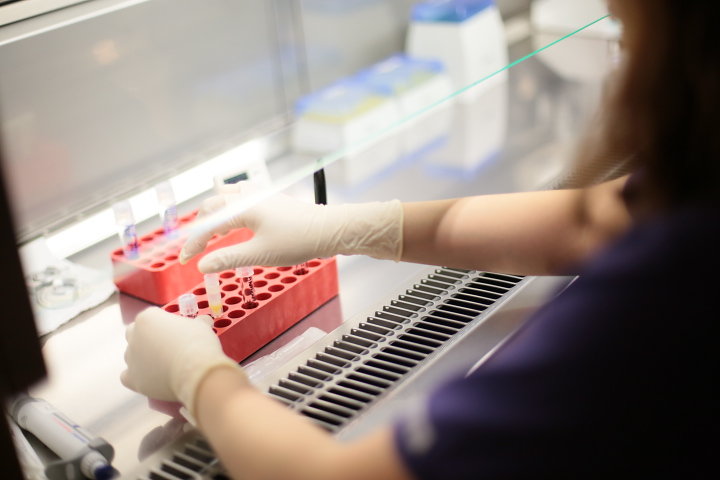Not many people openly discuss the difficulties falling pregnant, and trying to navigate or understand more about female fertility can be daunting. Most people are not aware how common fertility challenges are for women or how daunting it can be to overcome these obstacles.
The latest statistics show that:
The first step to identifying the causes of female infertility is through fertility testing. A typical set of female fertility tests we order include
To assess your hormone levels including follicle stimulating hormone and progesterone. If we need more information, we can also test for additional levels, such as luteinising hormone, prolactin, thyroid-stimulating hormone, and androgens.
Ultrasound imaging allows us to examine your reproductive organs such as the uterus and ovaries.
Depending on what we find with these preliminary tests, we may recommend additional specialised diagnostic tests, such as a hysteroscopy or laparoscopy.
Endometriosis is a painful condition affecting 1 in 10 women. It occurs when uterine tissue grows outside the uterus, causing symptoms like pelvic pain, heavy bleeding, and difficulty conceiving.
This chronic disease can significantly impact your life, both physically and emotionally. But you're not alone. Fertility First specialises in helping women with endometriosis achieve pregnancy.
Our tailored treatments combine medication, surgery, and assisted reproductive technologies to overcome the challenges of endometriosis.
Polycystic ovary syndrome (PCOS) affects 1 in 5 women, causing hormonal imbalances, irregular periods, and difficulty conceiving. Symptoms include excess hair, acne, weight gain, and mood swings.
While PCOS can impact your physical and mental health, it's treatable. Our fertility experts offer personalised plans combining lifestyle changes, medication, and advanced treatments to help you achieve pregnancy.
PCOS increases your risk of long-term health issues. Early diagnosis and management are crucial.
Pelvic inflammatory disease (PID) is a serious infection of the female reproductive organs that can lead to infertility. Caused by a bacterial infection of the cervix which spreads through the reproductive tract, PID can scar and block the fallopian tubes, hindering egg transportation. Early diagnosis and treatment are crucial to prevent long-term complications.
Symptoms of PID can include pelvic pain, abnormal vaginal discharge, fever, pain during sex, and painful urination. If you experience any of these symptoms, it's crucial to seek medical attention promptly.
At Fertility First, we understand the emotional and physical toll PID can take. Our experienced team offers comprehensive care, including diagnosis, treatment, and fertility options for those affected by PID. We provide a supportive environment and personalised treatment plans to help you overcome the challenges of infertility.
Ovulation disorders encompass a range of conditions involving menstrual abnormalities, including PCOS. If your ovulation cycles are irregular, infrequent, or absent, it can increase your difficulties in conceiving.
In addition to contributing to infertility, menstrual disorders can often impact your overall quality of life, as these are a sign of hormonal imbalance with effects beyond ovulation.
Through hormone testing and advanced diagnostic techniques, we can pinpoint the cause of your abnormal ovulation, then treat it and improve your fertility through medication, lifestyle changes, or assisted reproductive technology.
Difficulty conceiving despite having had a previous healthy pregnancy is known as secondary infertility. This can be just as emotionally challenging as primary infertility and in fact can sometimes come with more pressure.
The causes of secondary infertility are largely the same as those that can cause primary infertility in both men and women, such as endometriosis, ovulation disorders, or low sperm quality or quantity in men. However, the most common cause of secondary infertility is age. After having had your first child, you will obviously be older when it comes time to think about having a second. Fertility in women starts to decline from the age of 35, making it harder to conceive the older you are.
We recognise the importance of providing compassion and support to patients suffering from secondary infertility and we do not have an age limit on fertility treatment for patients. Providing patients with quality services including access to affordable donor eggs and donor sperm to maximise their success is something we feel is incredibly important.
Key things to consider before making your first fertility appointment
Infertility is defined as trying to actively fall pregnant with frequent intercourse for at least one year with no success for those under 35 years old, or if after 6 months for those over 35 years old. It is sometimes difficult to diagnose fertility problems in females and we recognise that every woman is different, that is why we offer many different fertility treatment options and a range of fertility tests available to help determine what the underlying problem may be.
It is estimated that 1 in 6 couples will have difficulty falling pregnant and approximately 30% of fertility problems will originate with the female. The most common causes of female infertility involve ovulation problems, polycystic ovary syndrome, issues with the fallopian tubes, implantation problems, and endometriosis.
As a woman ages, her fertility naturally declines. This is primarily due to changes in egg quality and quantity. Egg quality tends to deteriorate over time, making it more difficult for eggs to fertilise and develop into healthy embryos. Additionally, the number of eggs available for ovulation decreases with age.
Recent studies have also highlighted the potential role of chromosomal defects in fertility problems among older women.While the exact reasons are still being investigated, chromosomal abnormalities can interfere with the development and implantation of embryos.
At Fertility First, our experienced fertility specialists can provide personalised guidance and support to women facing age-related fertility challenges. We offer a range of fertility treatments to optimise your chances of conception, even if you’re over the age of 35.
Female infertility can occur due to a variety of factors, including ovulation disorders, hormone imbalances, thyroid gland problems, damage of the fallopian tubes, physiological issues with the uterus or cervix, endometriosis, fibroids, a lowered egg reserve due to premature menopause, or simply age.
It’s important to note that these are just some of the possible causes of female infertility, and the underlying reason for infertility can vary greatly from person to person. If you’re looking for more personalised information to help navigate your fertility journey, schedule a consultation with one of our Sydney fertility specialists.
While there is still ongoing research in the area of nutrition and fertility, studies have suggested that certain dietary factors can influence fertility. Consuming a balanced diet rich in essential nutrients, such as vitamins, minerals, and antioxidants, can support overall reproductive health which may in turn increase chances of conception. Some specific nutrients that have been linked to fertility include folic acid, iron, zinc, and antioxidants such as vitamin C.
While our advice on how to improve fertility offers valuable information and guidance for those facing female infertility challenges, it’s important to consult with a healthcare professional or registered dietitian for personalised dietary advice.
The fertile window is a term used to describe the 5-7 days of your menstrual cycle when it is possible to conceive. This is usually calculated as the 5 days prior to ovulation, the day of ovulation, and the day after ovulation. Having intercourse during this window gives you the best chance of falling pregnant.
We aim to have your test results back within 2 to 3 weeks. The exception to this is if you require an assessment of your fallopian tubes. Tubal assessment is performed using a specialised procedure known as hysterosalpingo-contrast-sonography (HyCoSy) or, if necessary, through laparoscopic (keyhole) surgery.

Embryologists are the scientists who specialise in reproductive science and literally create babies. The role of an embryologist is considerable, and we make up an important part of the Fertility First team during your treatment.

An immature egg is an oocyte that has not reached meiotic competency, meaning it hasn’t reached the first stages of meiotic division.

There’s a reason why it’s important you get your antioxidants, and it’s partly because of oxidative stress, which can lead to poor egg quality in IVF.

One of the most common causes of infertility in women is related to ovulation problems. Some of these ovulation problems are caused by hormonal disorders such as polycystic ovary syndrome which affect the release of eggs from the ovaries.